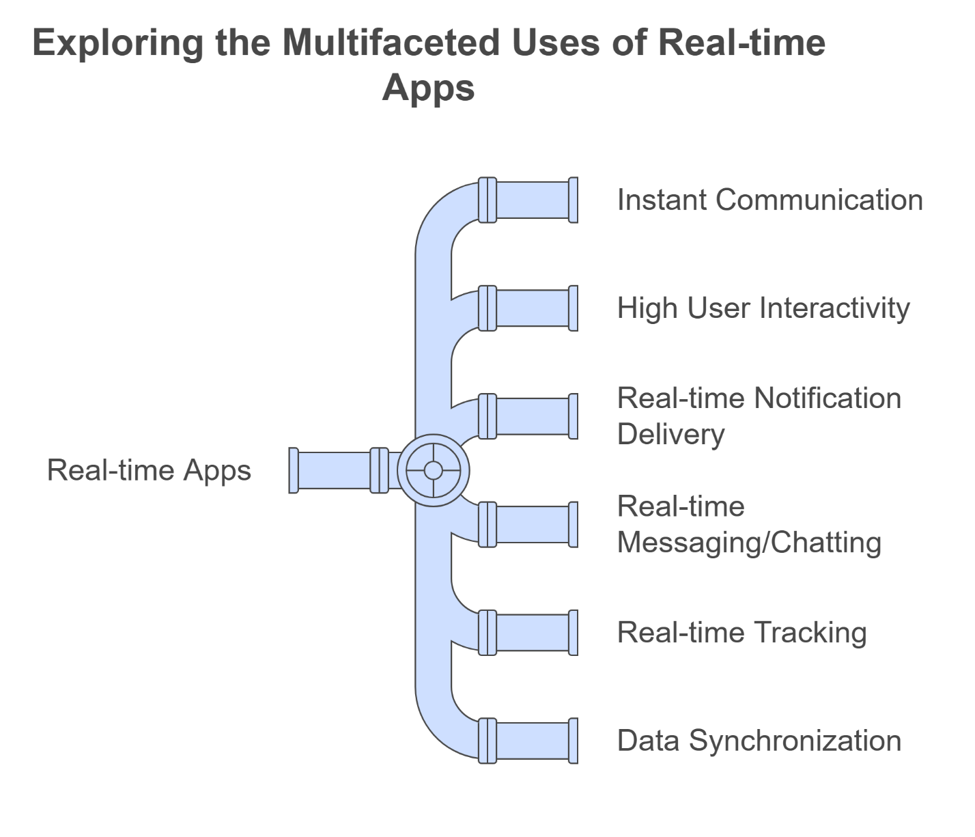The world is moving fast with smart devices, applications, and reliable internet connectivity. Mobile applications have become integral to our everyday lives, allowing us to complete everything with a few clicks. The value of time is growing constantly, and so is the reliability of real-time mobile applications. Businesses invest heavily in technologies that deliver quick data exchange and seamless interactions, from instant messaging to food ordering, cab booking, and live-streaming platforms.
In this evolution, Node.js has emerged as a game-changer for real-time application development. This robust runtime environment built on Chrome’s V8 JavaScript engine has efficient architecture, scalability, and a friendly ecosystem, which make it the go-to choice for building high-performance and interactive real-time applications.
Let’s explore why enterprises and developer communities rate Node.js highly for real-time mobile application development and why startups and businesses always seek to hire Node.js developers to fully leverage this runtime environment’s potential in their real-time app projects.
Contents
What does a Real-time Application do?
Real-time applications (RTAs) enable quick communication between users and servers. Instant messaging, chatting, online gaming, video conferencing, taxi booking, food delivery, and live streaming are prime examples of RTAs. Real-time apps are commonly used when real-time data is essential to complete a process; otherwise, the system may stop functioning or put the user at risk.
Real-time apps are used for several purposes, such as:
- Instant Communication
- High User Interactivity
- Real-time Notification Delivery
- Real-time Messaging/Chatting
- Real-time Tracking
- Data Synchronization
- Live Streaming
Node.js Role in Real-time Application
Because of its event-driven design and non-blocking input/output, Node.js can efficiently handle many connections simultaneously, making it an excellent choice for various tasks. By using WebSockets, Node.js allows smooth two-way communication. This allows developers to create systems that provide live updates, send push notifications, and effectively manage real-time data streams.
Its lightweight nature and JavaScript runtime provide a consistent development experience for both client and server sides, simplifying the creation of dynamic, interactive applications.
Node.js development company uses Node.js for real-time application development to gain the advantage of quickly adapting to changing demands, which ensures a strong and engaging user experience.
Real-Time Features Powered by Node.js Development
Regarding Node.js app development, businesses can harness its comprehensive suite of real-time features to enhance user experience and app functionality. Several real-time features that businesses can leverage:
- WebSockets: js supports WebSockets, which enable two-way communication between clients and servers. This is crucial for live chat applications and collaborative tools.
- Asynchronous Programming: js processes multiple requests simultaneously without blocking operations, ensuring smooth and responsive user experiences.
- Real-Time Data Streaming: Live video streaming or online gaming applications benefit immensely from Node.js’s ability to handle continuous data streams with minimal delay.
What Makes Node.js a Perfect Fit for Real-time App Development?
Node.js has transformed the development of real-time applications. The following key factors have contributed to the widespread adoption of this runtime environment.
Single Code: Node.js uses a single language for client—and server-side development, significantly reducing development time and effort. Its event-driven, non-blocking I/O model helps developers write highly efficient and scalable applications.
Non-Blocking I/O Model: Node.js uses a non-blocking I/O model, which helps it handle numerous connections simultaneously without getting tangled. This feature is helpful for chat applications and gaming platforms, where quick and seamless interaction is vital.
Event-Driven Architecture: Node.js is precisely engineered to manage events efficiently, making it an excellent choice for applications that require real-time interaction. It excels at facilitating push notifications, enabling users to receive instant alerts and updates. It supports live updates, allowing data to be transmitted seamlessly between the server and clients without refreshing the page.
Speed: Node.js’s event-driven architecture and non-blocking I/O model ensure that your applications can handle a large volume of requests without bargaining on speed or responsiveness. This makes it suitable for building high-performance, scalable, real-time web applications.
Scalability: Node.js is designed to handle both small-scale and large-scale applications easily. Its architecture allows it to efficiently manage high levels of concurrent requests, making it a perfect choice for modern applications that require both speed and scalability.
SEO Friendly: Node.js and Next.js work together to improve your application’s SEO. By rendering HTML on the server, they ensure your web content is readily accessible to search engines. This structured process allows search engines to index your site more efficiently, ultimately ranking in search results.
Final Thoughts
Node.js app development is a top choice for modern real-time applications due to its event-driven architecture, scalability, and cost-efficiency. Whether you are building a chat application, a gaming platform, or a live streaming service, Node.js offers the speed, responsiveness, and scalability essential for your application’s success. If you plan to develop your next primary real-time application using Node.js, partner with a frontline Node.js development company. Our Node.js experts will help you bring your vision to life with innovative solutions to meet your business needs.
Article written by,
Chetan Sheladiya
Chetan Sheladiya is a skilled Node.js expert and CEO of a leading product engineering company. He specializes in scalable server-side solutions, POC, and MVP development. With extensive experience in real-time applications and API integrations, he delivers efficient, high-performance systems tailored to diverse business needs.



Leave a Reply